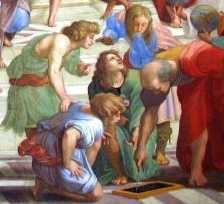mp3
Invocation of help
Vita sanctórum, via, spes salúsque,
Life of the saints, the Way, and Hope of salvation,
Christe largítor probitátis atque
O Christ, generous giver of uprightness and
cónditor pacis, tibi voce, sensu,
Author of peace, to Thee with song and with feeling,
pángimus hymnum:
we compose a hymn:
2. Cuius est virtus manifésta totum
Manifest (O Christ) that it is by your strength
quod pii posunt quod habent, quod ore,
all that the faithful are able (to do), all they have, whether by word,
corde vel factis cúpiunt, amóris
in the heart or by deed they desire,
igne flagrántes.
while burning with the fire of love.
3. Témporum pacem, fídei tenórem,
Peace in our time, steady course of faith
lánguidis curam veniámque lapsis,
cure for the sluggish and pardon for the fallen,
ómnibus præsta páriter beátæ
these grant to all equally, the gifts
múnera vitæ.
of the saintly life.
4. Æqua laus summum célebret Paréntem
Let equal praise honor the highest Father
teque, Salvátor, pie rex, per ævum;
and Thee, Savior, Holy King, through all time;
Spíritus Sancti résonet per omnem
may the glory of the Holy Spirit resound
glória mundum. Amen.
through all the universe.
Text: Walafrid Strabo ['squinter'] German monk and poet, d. 849
This was a difficult hymn to translate, especially the 2nd verse. I wish to acknowledge the help of Fr. Martin O'Keefe, S.J. from his book Exultemus: Rejoicing with God in the Hymns of the Roman Breviary, sent to me most kindly by bluejeepsiamese. [I'll have to get on the stick and send him back his Lentini this week, and start making a copy of the Neale translations he sent me!]
By the way, Walafrid the Squinter, who wrote this hymn, seems like a really interesting character. According to this article by Arthur Remy in the 1912 Catholic Encyclopedia, he penned a popular (in its time) commentary on Scripture, the Glosa Ordinaria, as well as a life of St. Gall. He also wrote a kind of precursor to Dante's Divine Comedy called The Vision of Wettin. All of his [extant]works in Latin can be found here.
Was St. Nicholas the mixed martial arts coach of St. John Chrysostom?
-
Today in the calendar of both the Novus Ordo and the Usus Antiquior it is
the feast of St. John Chrysostom (+407). Benedict XVI wrote a splendid
little Apo...
3 hours ago

2 comments:
Do you want to encourage praying the Divine Office?
I’ve just created a badge for blogs and websites.
Please have a look here:
http://www.liturgy.co.nz/ofthehours/badge.html
Let me know if there are any issues with this – size, etc.
Blessings
Thank you for this insightful translation. I must confess that the second verse never made any sense to me before I read your translation; I always thought that "manifesta" was an adjective modifying "virtus". Now that I see it is a command, the whole stanza makes sense, "Manifest, you to whom strength belongs, all that the pious are capable of, all they have, all they desire by mouth, heart, or deeds, when they burn with the fire of love."
"Spes salusque" means hope and salvation.
Post a Comment